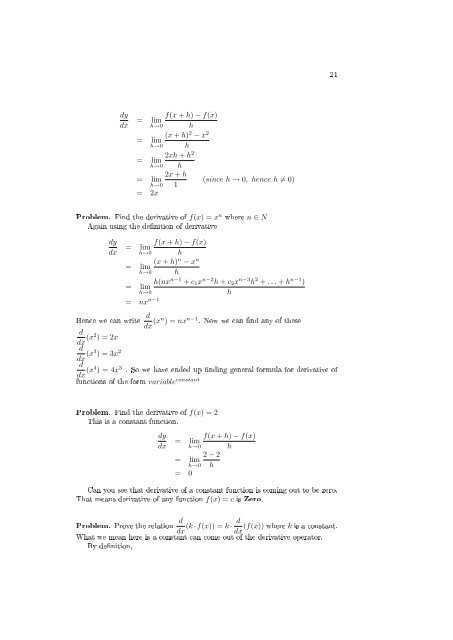Denition approach of learning new topics
You also want an ePaper? Increase the reach of your titles
YUMPU automatically turns print PDFs into web optimized ePapers that Google loves.
21<br />
dy<br />
dx = lim f(x + h) − f(x)<br />
h→0 h<br />
=<br />
(x + h) 2 − x 2<br />
lim<br />
h→0 h<br />
=<br />
2xh + h 2<br />
lim<br />
h→0 h<br />
=<br />
2x + h<br />
lim<br />
h→0 1<br />
(since h → 0, hence h ≠ 0)<br />
= 2x<br />
Problem. Find the derivative <strong>of</strong> f(x) = x n where n ∈ N<br />
Again using the denition <strong>of</strong> derivative<br />
dy<br />
dx = lim f(x + h) − f(x)<br />
h→0 h<br />
(x + h) n − x n<br />
= lim<br />
h→0 h<br />
= lim<br />
h→0<br />
h(nx n−1 + c 1 x n−2 h + c 2 x n−3 h 2 + . . . + h n−1 )<br />
h<br />
= nx n−1<br />
Hence we can write<br />
d<br />
dx (xn ) = nx n−1 . Now we can nd any <strong>of</strong> these<br />
d<br />
dx (x2 ) = 2x<br />
d<br />
dx (x3 ) = 3x 2<br />
d<br />
dx (x4 ) = 4x 3 . So we have ended up nding general formula for derivative <strong>of</strong><br />
functions <strong>of</strong> the form variable constant<br />
Problem. Find the derivative <strong>of</strong> f(x) = 2<br />
This is a constant function.<br />
dy<br />
dx = lim f(x + h) − f(x)<br />
h→0 h<br />
2 − 2<br />
= lim<br />
h→0 h<br />
= 0<br />
Can you see that derivative <strong>of</strong> a constant function is coming out to be zero.<br />
That means derivative <strong>of</strong> any function f(x) = c is Zero.<br />
Problem. Prove the relation d<br />
d<br />
(k · f(x)) = k · (f(x)) where k is a constant.<br />
dx dx<br />
What we mean here is a constant can come out <strong>of</strong> the derivative operator.<br />
By denition,



